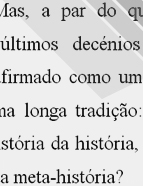

................................
Until the 1960s, the history of historiography in Portugal focused primarily on individual historians and their works. However, the contributions of V. Magalhães Godinho and Fidelino de Figueiredo marked a turning point by attempting to move beyond an individual perspective to trace general trends—typified in specific works—considered critically. University periodicals such as the Revista Portuguesa de História [Portuguese History Journal] (founded in 1941 in Coimbra) and Do Tempo e da História [Of Time and History] (Lisbon, 1965–72) revealed new dynamics in Portuguese historiography, which became modernis ed through contact with other European historiographies, particularly the French and Spanish. However, as the unbiased Silva Rego noted in 1956, Portuguese historians did not dedicate themselves to studying the history of other nations, and syntheses and works on the philosophy of history were sorely needed. Conversely, interest in the works of Alexandre Herculano (1810–77), the most influential figure of 19th-century Portuguese historiography, generated significant studies [Barradas de Carvalho, 1971 (1st ed. 1949) and A. José Saraiva, 1977 (1st ed. 1949)]. Interpretations of the historical thought of the author of História de Portugal, and the principal architect of 19th-century liberal narratives, diverged, particularly regarding his conception of history: What role did providence play in his historical narrative? To what extent did he value social condition ing in historical transformations? During this post-war period, which still lacked freedom of expression in Portugal and Spain, a central question arose: What place did the historian assign to the individual in history?
The prevailing idea was that Herculano's work represented a shift from earlier historiography insofar as, within the scope of a demand for documentary evidence, it distanced itself from foundational myths and, above all, introduced a critical and scientific method. In 1972, inspired by a concept from Marxist philosopher Louis Althusser, Barradas de Carvalho went so far as to describe Herculano's work as an "epistemological revolution," distinguishing it from all previous chronicles and historiography. W ithout referencing Barradas de Carvalho, Borges de Macedo (Alexandre Herculano, polémica e mensagem [Alexandre Herculano, controversy and message] 1980), later revised this interpretation, situating Herculano within a tradition of studies that dated back at least to the Academy of Sciences and the concept of history-as-science cultivated by historians associated with it (João Pedro Ribeiro and António Caetano do Amaral, among others). Without placing him in this tradition, Herculano's work would be incomprehensible.
